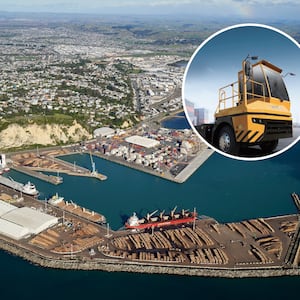World
Napier Port to Launch New Era with Self-Driving Truck Fleet

Napier Port has announced plans to introduce a fleet of twelve self-driving trucks, marking a significant advancement in port operations in New Zealand. Scheduled for deployment in 2026, these “battery-electric autonomous trucks and trailers” aim to enhance productivity while maintaining safety standards.
The investment for the fleet is projected to be between $20 million and $25 million, which will encompass the cost of the trucks and necessary infrastructure, including a battery swap station. This initiative represents a pioneering effort in New Zealand’s port sector, as both Napier Port and the Port Industry Association acknowledge it as the first of its kind in the country.
Learning from Past Experiences
While Napier Port prepares to embrace automation, the Port of Auckland offers a cautionary tale. The Auckland port previously attempted to introduce autonomous straddle carriers, a type of vehicle designed to move containers. That project faced numerous challenges, ultimately leading to a return to manual operations in 2022. The decision to revert was based on operational inefficiencies and technical difficulties experienced during the autonomous implementation.
In contrast, Napier Port is confident that its investment in self-driving technology will yield different results. The port’s management emphasizes that safety will remain a top priority during this transition. They believe that the new fleet will not only improve efficiency but also contribute to sustainability efforts through the use of battery-electric vehicles.
Future of Automation in New Zealand Ports
As automation technology continues to evolve, its potential impact on the logistics and transportation sectors becomes increasingly apparent. The introduction of self-driving trucks at Napier Port could serve as a model for other ports in New Zealand and beyond, paving the way for similar initiatives worldwide.
Industry experts speculate that the successful implementation of this technology could reduce operational costs and enhance service delivery. As Napier Port embarks on this innovative journey, stakeholders will be closely monitoring the outcomes, particularly regarding safety and efficiency metrics.
In conclusion, Napier Port’s decision to invest in a fleet of autonomous trucks represents a bold step into the future of port operations. With a commitment to safety and productivity, the port aims to leverage technology to improve its services while setting a precedent for the maritime industry in New Zealand.
-

 World3 months ago
World3 months agoTest Your Knowledge: Take the Herald’s Afternoon Quiz Today
-

 Sports3 months ago
Sports3 months agoPM Faces Backlash from Fans During Netball Trophy Ceremony
-

 Lifestyle3 months ago
Lifestyle3 months agoDunedin Designers Win Top Award at Hokonui Fashion Event
-

 Sports3 months ago
Sports3 months agoLiam Lawson Launches New Era for Racing Bulls with Strong Start
-

 Lifestyle3 months ago
Lifestyle3 months agoDisney Fan Reveals Dress Code Tips for Park Visitors
-

 World4 months ago
World4 months agoCoalition Forms to Preserve Māori Wards in Hawke’s Bay
-

 Health3 months ago
Health3 months agoWalking Faster Offers Major Health Benefits for Older Adults
-

 Politics3 months ago
Politics3 months agoScots Rally with Humor and Music to Protest Trump’s Visit
-

 Top Stories4 months ago
Top Stories4 months agoUK and India Finalize Trade Deal to Boost Economic Ties
-

 Entertainment3 months ago
Entertainment3 months agoExperience the Excitement of ‘Chief of War’ in Oʻahu
-

 World4 months ago
World4 months agoHuntly Begins Water Pipe Flushing to Resolve Brown Water Issue
-

 Science4 months ago
Science4 months agoNew Interactive Map Reveals Wairarapa Valley’s Geological Secrets









